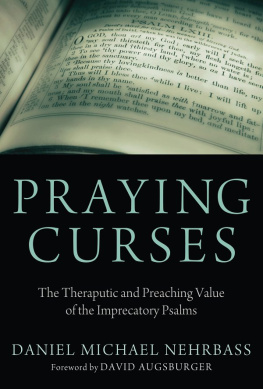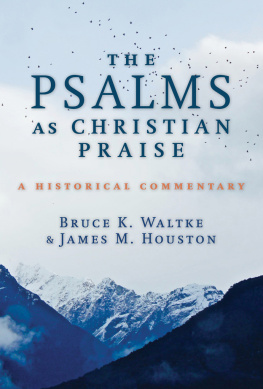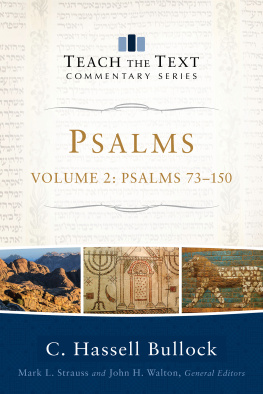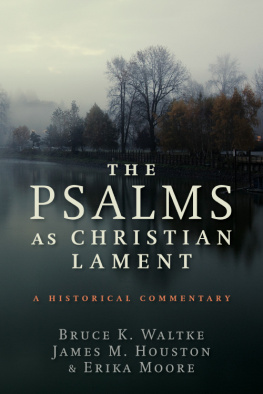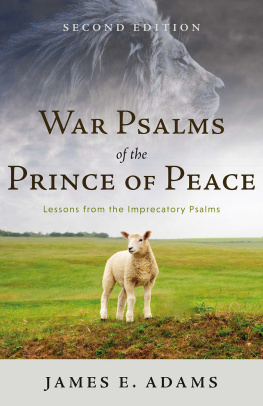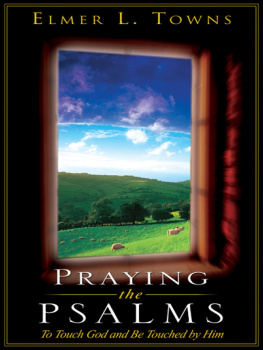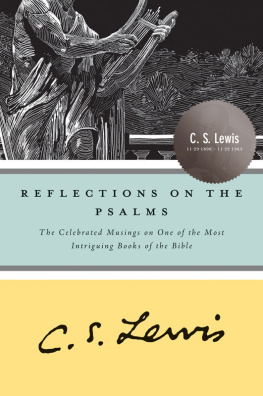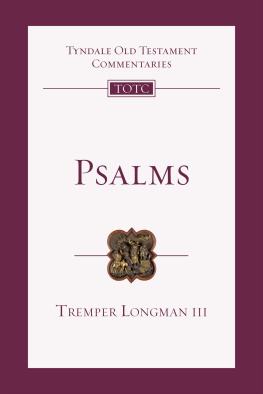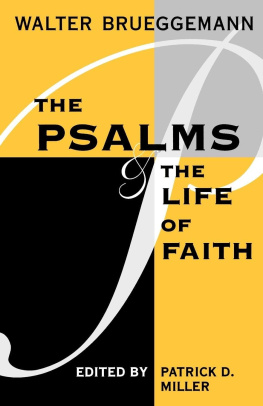Copyright 2013 Daniel Michael Nehrbass. All rights reserved. Except for brief quotations in critical publications or reviews, no part of this book may be reproduced in any manner without prior written permission from the publisher. Write: Permissions, Wipf and Stock Publishers, W. th Ave., Suite , Eugene, OR 97401 .
W. th Ave., Suite
Nehrbass, Daniel Michael.
Praying curses : the therapeutic and preaching value of the imprecatory psalms / Daniel Michael Nehrbass, with a foreword by David Augsburger.
xiv + pp. ; cm. Includes bibliographical references.
. Imprecatory psalms.. Bible. PsalmsCriticism, interpretations, etc.. Bible. PsalmsTheology.. Pastoral theology. I. Augsburger, David W. II. Title.
Manufactured in the U.S.A.
Forward
T he Christian Century reported, May 2012 , that Texas District Court Judge Martin Hoffman ruled that praying for God to hurt someone is not illegal.
The case before him was a lawsuit brought against U.S. Navy chaplain, Gordon Klingenschmitt, a Full Gospel minister, who used imprecatory Psalm to curse Mikey Weinstein, a Jewish agnostic and the founder of the Military Religious Freedom Foundation. Klingenschmitt, for good measure, called down Gods wrath on Weinsteins family as well. (Psalm calls for the death of an opponent and provides further curses upon the widow and children among other things.) As a result of the imprecatory prayers being posted on the Reverend Klingenschmitts website, Weinstein has received numerous death threats, had swastikas painted on his house, had his windows shot out and animal carcasses left on his doorstep. If God does not answer, friends of God will.
Weinstein is not the only recent object of imprecatory prayinga number of religious conservatives have invoked Psalm against President Obama. In fact, Mike ONeal, speaker of the House of Representatives in Kansas, sent a few verses from Psalm to Republican colleagues announcing, At lastI can honestly voice a biblical prayer for our president.
Anyone who experiences an inability to smile while reading the news notes cited above, may suffer from a critical irony deficiency. In the name of Jesus, forbidden fire is being called down from Heaven. (Luke :). One can only wish that this book by Daniel Nehrbass were available to all of the above. Indeed, virtually all of us share a great deal in common with our imprecatory friendsa need for wise guidance, not just in the practice of prayer, but in managing the vengeful anger that goes with us when we rise to go about relating, serving, counseling, preaching.
Whatever we do in ministry, we do in the light of the Psalter. We counsel, comfort, confront, consciously or unconsciously, from the wisdom of the Psalms. We can hardly worship in any other language than that strongly influenced by the Psalter. We learn to quote it as a child, The Lord is my Shepherd, we turn to it as we die, Yea, though I walk through the valley of the shadow of death, I will fear no evil, for Thou...
The Psalter teaches us to pray, comforts us in sorrow, gives language to our gratitude and praise, legitimates our deep feelings of abandonment, betrayal, loneliness, fear, anger, victimization. And the Psalter gives voice to revenge, to the deep desire that justice be seen to be done, and lacking that, for vindication, for retribution, indeed for exorbitant retaliationnot just an eye for an eye, but every enemy eye closed. Praying the Psalms leads us not just into familiar territory of the souls spiritual homeland, it leads us into the killing fields even to the wastelands of genocide. So what do we do with these bloody texts? Bloody prayers? Bloody cries? (Bloody in literal sense, not the British contraction of by-our-Lady).
Praying the Psalms is an audacious act of trust. Not just in the positive bonding Psalms the express love for the Lord and delight in community, but also for the severing Psalms that cut off the violent, the scornful, the slanderous in full recognition of encounter with evil. (It is also a treacherous razor edge to walk when pointing to the malevolence of the foe; in our accusations we accuse ourselves, in our condemnation we condemn ourselves). Some Psalms get sucked into the endless spiral of revenge. The supplicant so rarely can differentiate between seeking retributive justice and praying for parity in justice, for mutuality and transformative justice. One partys justice feels to the other party very much like revenge; just repayment leads to a cry for just counter-repayment and go on and on. Caught in the spiral of vengeance both parties may seek to triangle God into the dance. It is a rare prayer that humbly surrenders the justice controversy to a higher court. It is not our injured demands for redress that bring a halt to the spiral of vengeance, but forgiveness, When prayers of prosecution turn to prayers of lament, the sufferer ceases giving directions to the Divine and gives up god-like pretentions to administering the universe rightly.
Repeating the Psalms of lament is a bold
Repeating the Psalms of condemnation is a risky act of requital. The prayer of measure for measure goes from the longing for safety from those who wish or plan your downfall to a plea for reprisal, retribution or revenge from a coopted Almighty hand. It presumes the knowledge of what justice entails and does not hesitate to make demands for its delivery. The impulse to make quits fires the passions either of personal quest or in public request for satisfaction of ones most primary needs, an eye, a tooth, a hand, a child, a life. What shall we do with these concrete thoughts, these regressive drives, these toddler tantrums in ourselves? What shall we do with the tidal waves of desired revenge in our society? What shall we say when such issues issue from our souls even in the hour of Lectio Divina or in the liturgical readings of worship? And what do we say under our breath in extremis?
What use dare we make of the imprecatory Psalms and scathing, even genocidal readings from the prophets in our spiritual exercises, in our counseling, our teaching or from the pulpit? There they stand stark and unavoidable among our most exemplary and necessary texts. We cannot worship well without recourse to the Psalter nor express our deeper feelings without quoting the Psalms. The fact is we turn to them first and last in our times of sorrowa believers funeral is not a Christian funeral without Psalm . And Jesus suffering would make little sense, to the Gospel writers or to us, without the interpretive words of the Psalms. We do well to remember that both Mark and Matthew record only one word from the cross, the lament from Psalm , My God, My God, Why hast thou forsaken me? They take pains to trace nine parallels between Jesus death and the Psalm. And none of the Gospel writers quote an imprecatory word. Jesus turned to Psalm , not Psalm . (He is the one who reversed the Law of Lamechseventy-seven blows returned for every one receivedto bring an end to all mathematics of retaliationforgive seventy-seven times.)

